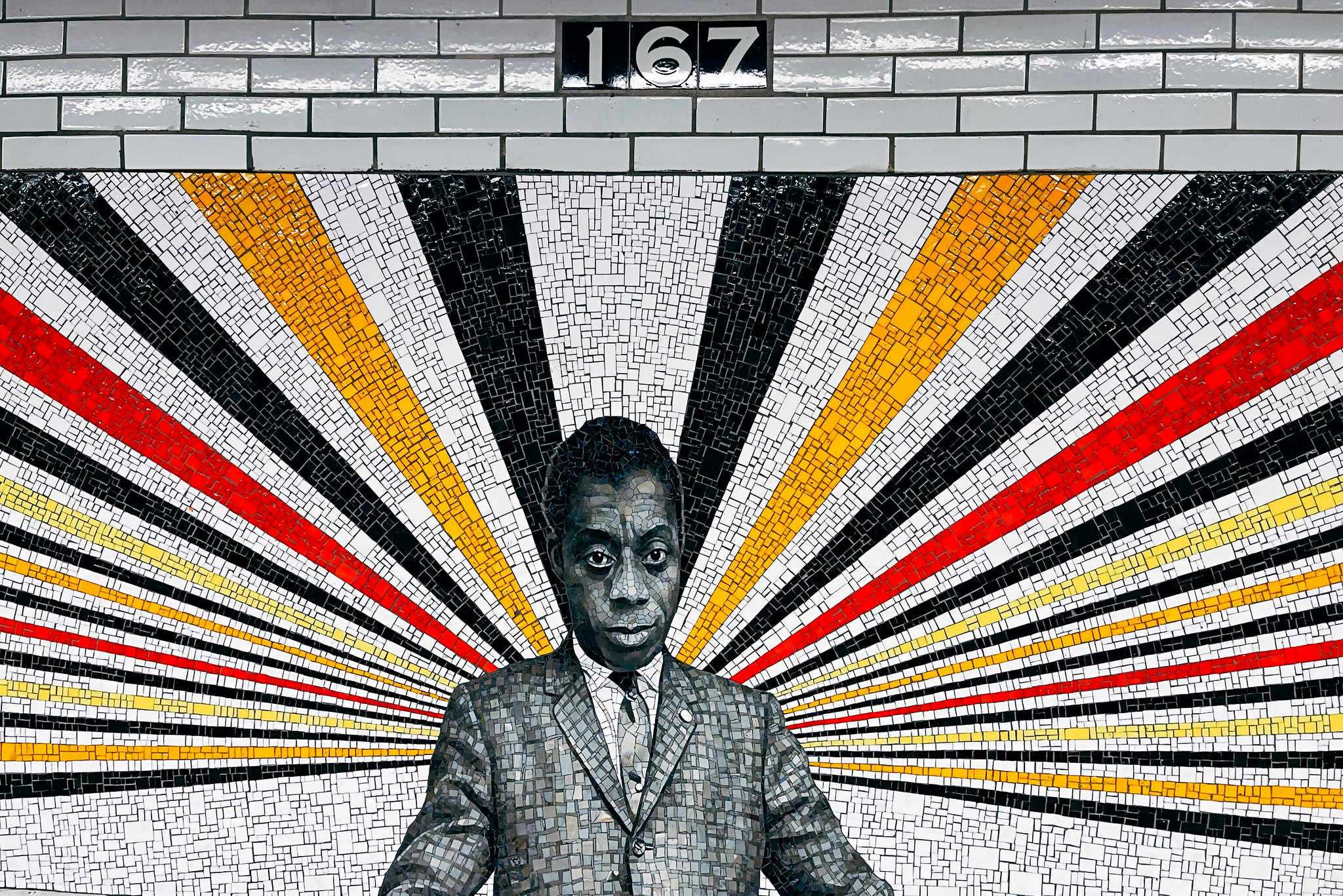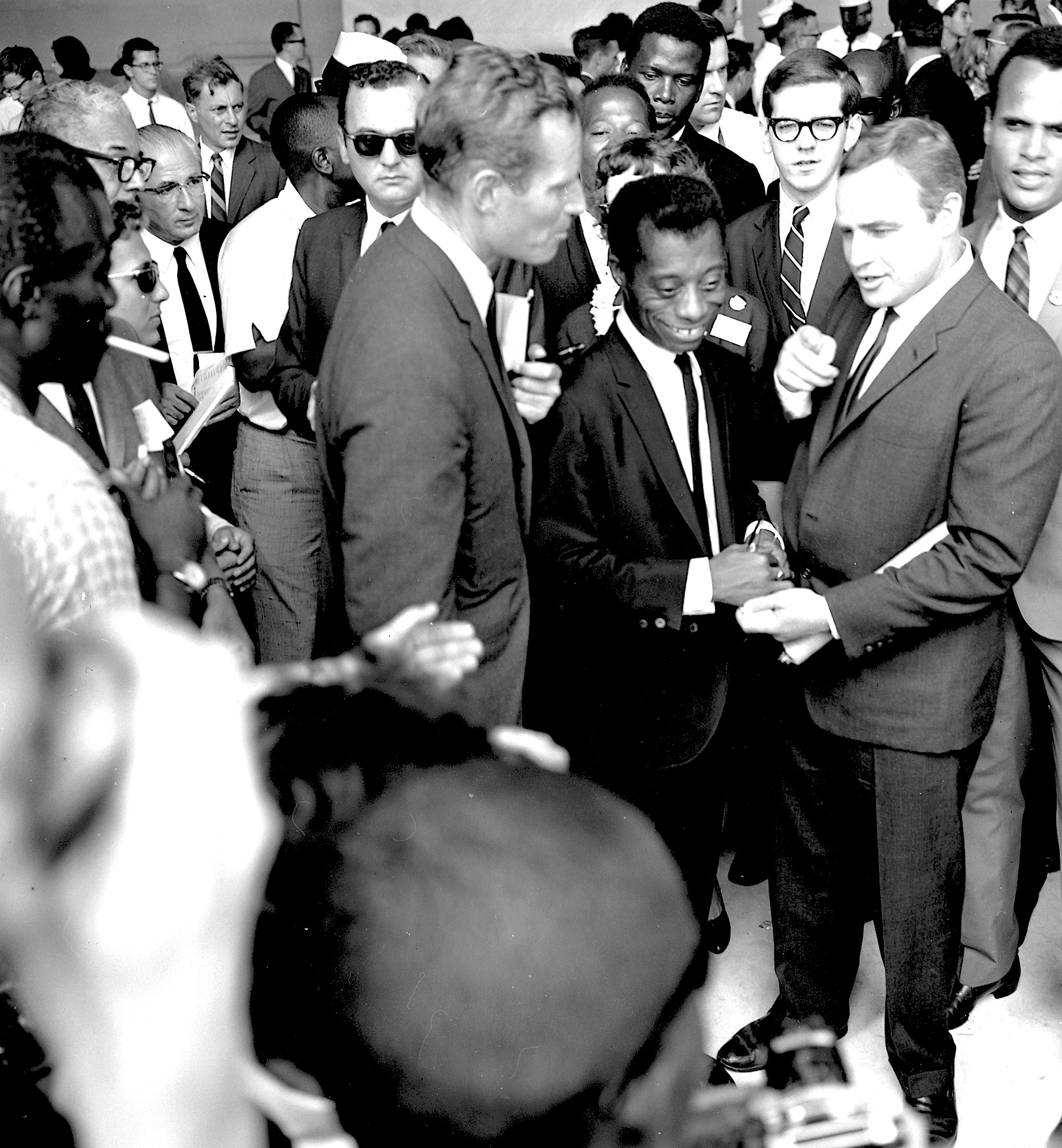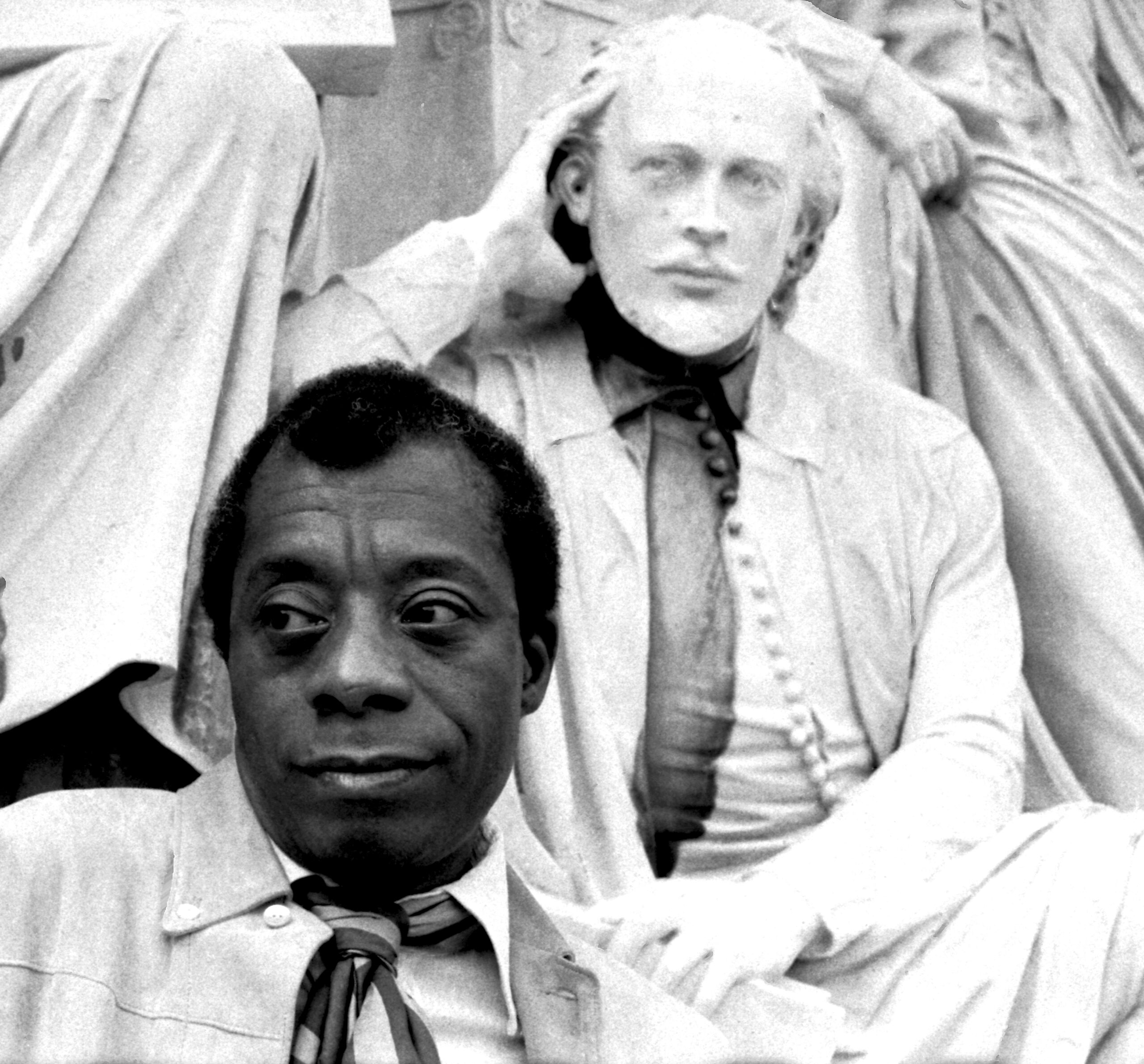Things got lost in our remembrances.

James Baldwin mural by Rico Gatson at the 167th Street subway station, New York. (Kathy Drasky/Flickr, CC BY 2.0)
By Patrick Lawrence
Special to Consortium News
 James Baldwin would have celebrated his 100th birthday on Aug. 2, had he lived so long. He didn’t: He died young.
James Baldwin would have celebrated his 100th birthday on Aug. 2, had he lived so long. He didn’t: He died young.
He was but 63 on Dec. 1, 1987, the day he slipped away at the shabby-grand house in Saint–Paul-de–Vence, France, where he had lived since 1970, a refugee from … from a lot of things, not least America and what it was on the way to becoming.
There is a long, strange story behind the house and Baldwin’s residence in it, told satisfactorily in Jules Farber’s not-brilliantly-written James Baldwin: Escape From America, Exile in Provence (Pelican Publishing, 2016).
Harlem, Paris, a Swiss hamlet where he was the first black man the townsfolk had ever seen; Istanbul, Greenwich Village, William Styron’s place in Connecticut, and finally the South of France: The Saint–Paul house gave the not-quite-of-this-world writer the home that had theretofore eluded him. It is worth a pencil-sketch.
Baldwin first lived and wrote in the house — worn-thin elegance, profuse gardens — as a tenant of one Jeanne Faure, a repatriated settler from Algeria who was given to the politics of nostalgic colonials, as were most of the pieds noirs. Tenant and landlady drew close over time, oddly, and by the time Baldwin departed this world he was buying the place in installments.
But when Mme. Faure died, things got complicated. Her housekeeper, Josette Bazzini, claimed Faure had left the place to her, not Baldwin, as many people familiar with the scene said was the case. Baldwin’s family wanted to preserve the residence as a sort of memorial. A French court eventually ruled in favor of the housekeeper, and in time the property fell into the hands of a developer.
There is now nothing left of it. Where the house once stood and the gardens grew lushly elaborate there are holiday villas, a swimming pool, and the whole TSOF nine. Baldwin does not rate even one of those marble plaques with which the French mark the previous presence of the great: Ici vivait James Baldwin, l’écrivain américain, etc.
There are many worthy things to say about Baldwin on this occasion, but the story of the house pushes itself to the front of my mind as I reflect on his centennial. I have seen a number of remembrances, although not nearly as many as Baldwin merits on account of his life, his work, and his thinking.
And among those to come out these past days he does not seem — I’ll simply say this — especially well-remembered. Some things seem to me to have been lost.

Baldwin’s house in Saint-Paul-de-Vence in 2009, before its subsequent demolition. (Wikipedia Commons, CC0)
Great writers, and I count Baldwin among these, are not to be put on shelves where they begin to gather dust — pigeon-holed, this is to say, by way of a few stock adjectives that save people the trouble of thinking very hard about them. Writer, civil-rights activist, gay advocate, witness, prophet: Yes, well.
There is the elephant’s trunk, the elephant’s tail, and the elephant. It was Baldwin’s wholeness that made him James Baldwin, the man who lives among us by way of the best work.
Many readers know Baldwin by his immensely powerful essays. In Notes of a Native Son, The Fire Next Time, No Name in the Street, The Devil Finds Work, The Evidence of Things Not Seen, and so on you find many sides of Baldwin: The pulpit sermonizer he trained early on to be, the man of letters, the journalist, the political philosopher, the media critic.
There is enduring greatness in the best of these pieces. His sentences can come at you with the force of a controlled eruption. His diction is always masterful.
Along with this went the civil rights work, speaking and writing, the extended travels in the South, the fruitful friendships: King, Harry Belafonte, Brando, Medgar Evers, lots of others — altogether the unflinching solidarity.

Baldwin, right of center, with Hollywood actors Charlton Heston, left, and Marlon Brando, right, at the 1963 March on Washington for Jobs and Freedom. Sidney Poitier, rear, and Harry Belafonte, right of Brando, can also be seen in the crowd. (U.S. Information Agency. Press and Publications Service, Wikimedia Commons, Public domain)
But Baldwin always wanted to be understood first as a novelist, David Leeming, a longtime friend, wrote in James Baldwin: A Biography (Knopf, 1994). It is debatable whether posterity will let Baldwin have his way, or whether he should. But I am struck — maybe a piece of evidence here — by how little the novels figure in the various remembrances marking his 100th.
Go Tell It on the Mountain, 1953, was Baldwin’s first book and also his first published novel. Already he is in search of something more than what history handed him and the realities with which black life in mid-century America faced him.
He looked over the fence of protest literature and the political novel to infuse his writing with complexities of black experience hitherto unexplored in fiction. Baldwin was after, in a word I hope not too reductive, interiority. Go Tell It is the story of John Grimes, a teenager whose family was part of the prewar and immediate postwar Great Migration.
“It was Baldwin’s wholeness that made him James Baldwin, the man who lives among us by way of the best work.”
He is eager to escape the fates of those around him: the confinements, the learned inferiority, the self-contempt, the domestic turmoil — all the consequences of an inherited black identity. Grimes’ project, as Leeming puts it, is “salvation from the chains and fetters.”
Giovanni’s Room, 1956, continues Baldwin’s quest in a way that may not be immediately evident. David, the American protagonist, is in Paris and draws close to an Italian bartender named Giovanni even though he, David, is engaged. The novel is in essence the story of David’s inner turmoil as he discovers and explores his love for another man, along with his own subliminal homophobia.
Giovanni’s Room was well-received, despite Baldwin’s anxieties as he published a novel featuring the theme of homosexuality. And here is one of the most interesting things about this book. There are no black characters in it. David, Giovanni, Hella (David’s fiancée) are white.
You can call Giovanni’s Room “a gay novel” if you like, but the phrase implies things about Baldwin that were not so, while missing a big part of his aspiration. Baldwin was openly gay but also a private man. In Giovanni’s Room he wanted to write a novel declaring that he was a writer, as against a black writer.
“If I hadn’t written that book,” Baldwin said in a later interview with Richard Goldstein, the New York journalist, “I would have probably had to stop writing altogether.” Goldstein suggests this was because Baldwin freed himself by writing of his homosexuality.
I wasn’t at the interview and take this to be so: Baldwin finished the book while deeply in love with Lucien Happersberger, a Swiss painter he had met in Paris. But I question whether it was equally important for Baldwin to escape the confines of “black novelist” just as John Grimes sought escape from all that was dropped on his shoulders by way of a black identity that left him incomplete.
“He looked over the fence of protest literature and the political novel to infuse his writing with complexities of black experience hitherto unexplored in fiction.”
I was young when I read Another Country, 1962, and recall now that it never occurred to me to think of it as anything other than a complex novel teeming with characters and set primarily in the Greenwich Village of the late-1950s, the late-Beat years.
The themes of race and sexual identity are prominent, certainly, but — I will put it more strongly in this case — there is no counting Another Country a gay novel, and it could not possibly be further from any kind of protest novel.
Baldwin’s theme is better described as the anomie that afflicted (and afflicts) Americans quite regardless of race or sexual preference.
This was Baldwin’s “big book,” if you go for such phrases. What struck me were Baldwin’s exceedingly nuanced sentences — sometimes exquisite to the point of “too,” I thought. Baldwin’s regard for Henry James seemed to me obvious in the writing, and he later acknowledged his debt.
Not only did he learn, perhaps too much, from James’ elaborate style; he was also and very evidently drawn to James’ givenness to psychological explorations of his characters.
Baldwin is still depicting the interiority of his own characters as they make their ways through the America of their time. This saved him as a writer, in my view. He worked, once again, as a novelist as against a black novelist or a gay novelist.
Had Baldwin treated race, gender, and politics differently — putting them in a different place in the writing — Another Country would have read more as ephemeral advocacy than literature.

Baldwin with the statue of Shakespeare at the Albert Memorial, 1969. (Portrait by Allan Warren, Wikimedia Commons, CC BY-SA 3.0)
These are the major novels, as they are commonly rated. People do not read novels much anymore, and I can hardly blame them given the piffle written by the legions of M.F.A. graduates producing “debut novels” that amount to, let’s say, manuscripts to nowhere.
But in Baldwin’s novels we find much that suggests the whole man — not merely the trunk or the tail but the elephant with black skin.
One of the things that comes through in the novels and everything else Baldwin wrote, providing you know to look for it, is the absolute primacy he assigned to love. And he meant this, we can be very sure, in all three of its meanings.
Maybe it was the Christian preacher in him: It was agape, the unqualified love of humanity, along with the associated caritas, that mattered as much or more to him than eros alone:
“All love bridges the immense expanse between lonelinesses, becomes the telescope that brings another life closer and, in consequence, also magnifies the significance of their entire world.”
And:
“Love takes off the masks that we fear we cannot.”
And, among many other aphorisms like these:
“The world is held together, really it is held together, by the love and the passion of a very few people. Otherwise, of course, you can despair.”
In 1965 Baldwin debated William F. Buckley, the noted conservative, during a famous session of the Cambridge Union. It was televised live by NET, the more serious precursor to our frivolous PBS, and was a sensation when it aired.
The proposition tabled was, “The American dream is at the expense of the American Negro.” You can view the original NET video here or read a transcript, thoughtfully produced by a site called Blog #42, here.
Baldwin made short work of the windy founder, publisher and editor of the National Review, and won the day by a vote of 544-to-164. In the course of this he displayed an astonishing compassion for the oppressors of black people that is all about, let’s say, applied agape.
Sheriff James Clark participated in the violent arrests of civil rights protestors during the Selma-to–Montgomery marches not long before the Cambridge debate:
“I suggest that what has happened to white Southerners is, in some ways, after all, much worse than what has happened to Negroes there because Sheriff Clark in Selma, Alabama, cannot be considered — you know, no one can be dismissed as a total monster. I’m sure he loves his wife, his children. I’m sure, you know, he likes to get drunk. You know, after all, one’s got to assume he is visibly a man like me.
But he doesn’t know what drives him to use the club, to menace with the gun and to use the cattle prod. Something awful must have happened to a human being to be able to put a cattle prod against a woman’s breasts, for example. What happens to the woman is ghastly. What happens to the man who does it is in some ways much, much worse.”
Something else comes through in this passage apart from Baldwin’s unqualified humanity. It is his love of America, also expressed on many occasions, most famously in Notes of a Native Son:
“I love America more than any other country in this world and exactly for this reason, I insist on the right to criticize her perpetually.”
In May 1969, Baldwin sat for an interview on the widely watched Dick Cavett Show. A segment of the exchange was incorporated into I Am Not Your Negro, the 2016 documentary on Baldwin’s life and work.
“Is it at once getting better and still hopeless?” Cavett asked with reference to what was then commonly termed “the Negro problem.” Baldwin’s reply:
“I don’t think there’s much hope for it to tell you the truth, as long as people are using this peculiar language. It’s not a question what happens to the Negro here, or the black man here. That’s a very good question for me, but the real question is, ‘What’s going to happen to this country?’”
This was Baldwin. The Negro problem was the American problem. “We’re all in this together” has become an odious phrase, co-opted in the advertising of credit unions and other such institutions.
But it was Baldwin’s thought, full of meaning then. He wanted America to escape its past, what history handed the living, just as some of the characters in his novels seek to do.
“This was Baldwin. The Negro problem was the American problem.”
Here is how Baldwin, black man, humanist, and prophet at once, finished up in Cambridge:
“It is a terrible thing for an entire people to surrender to the notion that one-ninth of its population is beneath them. And until that moment, until the moment comes when we, the Americans, we, the American people, are able to accept the fact, that I have to accept, for example, that my ancestors are both white and black.
That on that continent we are trying to forge a new identity for which we need each other and that I am not a ward of America. I am not an object of missionary charity. I am one of the people who built the country — until this moment there is scarcely any hope for the American dream, because the people who are denied participation in it, by their very presence, will wreck it. And if that happens it is a very grave moment for the West.”
It is a wonderful thing to mark the centennial of so fine a writer and so fine a man. But we ought to recognize that we have little claim to him. We, the Americans, as he would say, do not seem to understand him very well.
We have lost a great deal of what he stood for. It is destroyed, gone, like the house in Saint–Paul-de–Vence and in many pitiful respects, for the same reason.
You cannot argue the point, “We’re all in this together” now and expect to be taken the slightest seriously. We, the Americans, do not seem to be in anything together.
Identity politics, the culture of wokery, Black Lives Matter, The 1619 Project, “cultural appropriation,” and all the other paraphernalia of our moment: It all turns on an axis of divisiveness. I do not think, I confidently do not think, Baldwin would do other than hang his head in sadness at the sight of this spectacle.
Ditto, it goes without saying, the police violence of these past years, which seems straight out of Sheriff Clark’s segregationist South. And then the disgraceful demagoguery in our political discourse, as deployed notably but not only by the liberal authoritarians among us.
There does not seem to be a “we” any longer as Baldwin could credibly use this word. As to his professed love of America, can one any longer understand it? Does it not seem a touch anachronistic? What is there left to love after all the damage done over the years that separate his time from ours?
They don’t make many like James Baldwin anymore. Let us mark his anniversary but not pretend otherwise. In his day and ours, the love and the passion of a very few people are still all that hold us together.
Patrick Lawrence, a correspondent abroad for many years, chiefly for The International Herald Tribune, is a columnist, essayist, lecturer and author, most recently of Journalists and Their Shadows, available from Clarity Press or via Amazon. Other books include Time No Longer: Americans After the American Century. His Twitter account, @thefloutist, has been permanently censored.
TO MY READERS. Independent publications and those who write for them reach a moment that is difficult and full of promise all at once. On one hand, we assume ever greater responsibilities in the face of mainstream media’s mounting derelictions. On the other, we have found no sustaining revenue model and so must turn directly to our readers for support. I am committed to independent journalism for the duration: I see no other future for American media. But the path grows steeper, and as it does I need your help. This grows urgent now. In recognition of the commitment to independent journalism, please subscribe to The Floutist, or via my Patreon account.
The views expressed are solely those of the author and may or may not reflect those of Consortium News.

Thank you for this remembrance and honouring of James Baldwin. I’ve read a number of his books and listened to the debate with Buckley, as well as others. Baldwin was an intellectual giant, a great writer and an astute observer of American society and humanity. I love him the most for his great compassion – especially for the those who cause harm to others. In Buddhism this is the the mark of an enlightened being. Those that cause harm to others suffer the most, because their minds are filled with anger and hate. Baldwin understood this and before I embraced Buddhism, I learned this from James Baldwin. I am forever grateful to him and the legacy he left behind.
“Identity politics, the culture of wokery, Black Lives Matter, The 1619 Project, “cultural appropriation,” and all the other paraphernalia of our moment: It all turns on an axis of divisiveness. I do not think, I confidently do not think, Baldwin would do other than hang his head in sadness at the sight of this spectacle.”
Yes, and I feel the same sadness.
I was in high school in 1965. This before the Vietnam war tore apart the D party and well before the neolibs purged the New Dealers. Our Teen Age Democrats (TAD) group watched the NET debate. I admit that I was rather naive about the reality Mr. Baldwin described in such intense detail. After that, I made sure to read his work. I was 21 when he was on the Dick Cavett Show; by then having run local political campaigns, I was a lot more savvy. Enough to realize Baldwin was a brilliant, clear voice speaking truth to power.
Thank you PATRICK LAWRENCE for this tribute to the remarkable thinker James Baldwin.
I think of him first as a human being which is rare, very rare these days.
The highest achievement of what a human can rise to.
Honest, brilliant, modest. a tormented suffering soul who stood for something fine and real in spite of the abuse and disrespect showered on him by far lesser people and institutions.
I love the guy and feel better when I hear or read what he had to say and what he was thinking.
God bless you Patrick!
Anyone interested in Baldwin should look into the work being done by Dr. Anthony Monteiro.
Does even having read a little of Baldwin’s available ‘oeuvre’ in English not count for anything?
It definitely does “ouvre” the mind to the pretensions in bigotry, no matter the cultural or linguistic context.
I offer the deepest appreciation for this. Even though I’ve long known of the man, I’ve not read enough of his work. I shall change that, and like unto my feeling of kinship with Wendell Berry, read everything I can. And for what it’s worth, I share here something of my own writings from a character who grew up in an extremely toxic environment but found his way to people rooted in love.
“I was flooded with a sense of belonging. No estrangement from my past could shake the certainty of the present time. Such estrangements from my past could not alter the reality of what I now know. I am loved and I know it. I love and those I love know it. The silence enveloped me in peace. The peace beamed from my soul like the bright rays of the summer sun. The light cannot now be extinguished even when death comes to me. Even when those I love join me or precede me in their own death. Love cannot die. The light of love burns on.” Jaime from the novel “Night Air Descending” by TP Graf
Bravo, Patrick Lawrence. Keep shining that light.
“If the concept of God has any validity or any use, it can only be to make us larger, freer, and more loving. If God cannot do this, then it is time we got rid of Him.”
James Baldwin
No, Patrick Lawrence, they don’t make many like James Baldwin anymore. In fact, they make none, or very few. You’ve written a marvelous appreciation of his work. You’ll hear virtually no one anymore assenting to the logic of his prose within the certainty of his spiritual truth. Nothing floated as reality over the last 2000 years has any reality beyond the accrual of riches and power. The West is dying from a lack of imagination. You would never know that the Renaissance even occurred. It’s all been reduced to the inevitability of numbers and the displacement of being. That Baldwin hoped for something better is not a negative. It is a positive.
hXXps://www.milibrary.org/events/baldwin-seminar-dr-nigel-hatton-aug-27-2024 – James Baldwin Seminar with Dr. Nigel Hatton
A hybrid seminar (12 sessions) meticulously crafted to delve into the profound depths of James Baldwin’s works.
Thanks for remembering James Baldwin.
Superb, comprehensive and accurate take on Baldwin. He hoped, always, that white America would come to consciousness of the sick, ahistoric, vacuous trance it lived in that made white American lives so empty, cruel and worthless. It has not. It is managed so as to permanize its horrid and brutal nullity.
Grateful to you Patrick Lawrence for taking time and care in sensitively writing about James Baldwin. Your recognition of his “wholeness”- not just a Black, a man, a writer, a prophet – but a wholeness attained by his lived understanding of love. For him to perceive Sheriff Clark as a wounded man is to have undergone all that that requires: goodly lonely time in the land of suffering, enough time and intentionality to release the victim mentality and get beyond emotional reactivity- vengeance, grudge keeping, violence, bitterness,rage – and to open into the heart of love and the understanding in there knowing that we all started off in life as precious babies and only become cruel as we are rejected, neglected, ignored, beaten. Special thanks for Baldwin’s gems of love. These are going into my journal for keeps
“All love bridges the immense expanse between lonelinesses, becomes the telescope that brings another life closer and, in consequence, also magnifies the significance of their entire world.”
“Love takes off the masks that we fear we cannot.” “The world is held together, really it is held together, by the love and the passion of a very few people. Otherwise, of course, you can despair.”
I share your grief at the loss of the “we'”. Perhaps, a new “we” will emerge out of the lessons we’re being slammed with – all the mechanisms/dynamics of human-made soullessness. Walled offness. From the springs of living waters – understanding, love, empathy, compassion, caring, response-ability, justness, liberty, truth.
“Something awful must have happened to a human being to be able to put a cattle prod against a woman’s breasts, for example. What happens to the woman is ghastly. What happens to the man who does it is in some ways much, much worse.”
I can’t help, given today’s reality, reading this in the context of the Israeli treatment of the Palestinians. We read daily of horrific atrocities and are devastated on behalf of the Palestinian victims. But I can’t help but ask, what is the psychological impact on the Israeli perpetrators? Those young men (and women) will one day return from their stint in the army and will have to grapple with what they have done, what responsibility they bear, and how they will live their life going forward.
“It is a terrible thing for an entire people to surrender to the notion that one-ninth of its population is beneath them.”
Indeed it is, as Baldwin recognized and the Israeli’s are about to discover.
Years ago I read something somewhere — can’t remember where, and I don’t necessarily totally agree — that essentially made the argument that Baldwin was a tool of domestic intel meant to sow division between whites and blacks. Not sure I’m on board with that wild theory.
It is quite evident if you have read even a little of Baldwin’s work that that is false. His whole ouvre was based on the idea that there should be no division.
In Joel Whitney’s seminal article “Finks: how the CIA tricked the world’s best writers” (google it), he mentions James Baldwin and how the CIA championed him.
Yes, Drew, for full context. When he was very young and the method used would have been new to newly minted intellectuals trying to find their footing and platform, Baldwin very briefly succumbed. He reported for the CIA-funded magazine Encounter on a supposedly communist-funded peace congress in Paris in 1956. But the important thing is that Baldwin got wise to what was happening to him rather quickly, rather ingeniously; even though he was still on the anticommunist dole, so to speak, he subverted the mission, recording the mockery that the US earned by banning W.E.B DuBois from traveling to the congress. What a thing to record in Encounter. His editor didn’t like it. From there, Baldwin’s brilliance, and independence, only got sharper, more explicit and more eloquent.
That is brainless idiocy.
In Joel Whitney’s article, “Finks: how the CIA tricked the world’s best writers” he mentions James Baldwin and how the CIA buttressed him at times.
Joel Whitney’s book, “Finks: how the CIA tricked the world’s best writers” addresses how the CIA buttressed James Baldwin.
Joel Whitney’s book “Finks” addresses how intel buttressed James Baldwin’s works at times.
See my reply comment to Carolyn L Zaremba above.
I think the “text” you were reading meant that you should be the “tool” of division between blacks and whites. It’s propaganda.